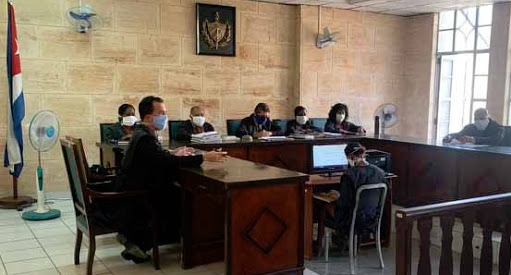The Criminal Procedure Law in force in Cuba does not say a word about "show trials." Despite this, there is a long "tradition" of proceedings of this kind on the Island, and the regime is taking advantage of it during the pandemic.
Many citizens are currently being tried on charges such as "spreading and epidemic", and "theft," a frequent crime in a country where corruption transcends all levels of society.
The main characteristics of these proceedings are their organisation by the Communist Party, their speed, pre-determined guilt, harsh sentences, and the publicity they receive. They constitute an instrument of intimidation, defending the interests of the regime above Justice.
A revolutionary "tradition"
Show trials date back to the start of the 1959 Revolution in Cuba, when the fledgling government instituted "revolutionary tribunals" to try, with supposed "popular transparency" those accused of having participated in crimes and torture during the Fulgencio Batista dictatorship.
The practice originated in monarchies' old adversarial law, but reached its peak under the inquisitorial ecclesiastical law, which extracted confessions of guilt from those accused of a crime or sin through torture.
These trials were carried out as a social punishment. The accused was convicted from the outset, and often received his punishment in public.
Initially show trials were held in Cuba outside the premises of the courts; in parks, cinemas, clubs, open social circles or other public areas.
The Supreme Court eliminated the practice because it trampled on justice, rights and the protection of the accused, and today almost all trials are held in the courts.
However, the Communist Party may still order show trials to be held, due to their interest in the matter to be judged, or at the request of the Interior Ministry.
The PCC can also choose those to attend, selecting those that, in its view, should receive a cautioning.
For example, current trials are attended by bodega managers and internal commerce workers, who witness the consequences of crimes committed by other employees in their sectors, as to daunt them.
Conviction as a political, not a judicial matter
In Cuba - before and now - show trials have had as a prerequisite that sufficient evidence be received by the court for it to convict the accused.
Thus, the crime has already been corroborated by the judges beforehand, such that the justice proceedings are just a spectacle for the public, and the sentence to be imposed is chosen from among the most severe.
What makes the trial a "show" is not just the degree of publicity it receives, as today, in democracies, trials can be filmed live and even narrated by journalists and specialists as they unfold.
Rather, these trials, in the Cuban case, are defined by their purpose of making an example of the accused, with this end transcending the standards or rules established by the law. This constrains the independence of the judge, who is obliged to issue a political rather than a political ruling.
It is not about the crime, but rather the punishment
Show trials are typical of totalitarian regimes such as Cuba's, in which, although there exists a judicial system with the declared function of imparting justice, the courts do not constitute an independent power, but rather entities subordinate to the sole Party, to which the Constitution grants supreme power over the nation.
Without exception, citizens who sit for an show trial will not only be found guilty, but will receive severe sanctions. Because is not about the infraction they have committed, but rather the effect that the punishment will have on the people, whether they are forced to attend the trial at the site of the tribunal, or are informed about it through State media.
